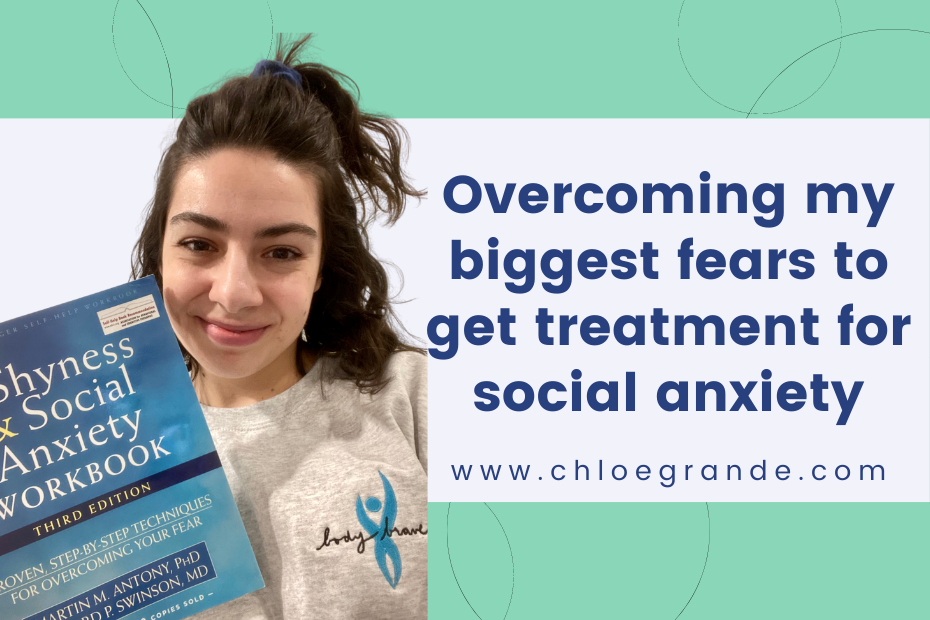Just over a year ago, I started seeing a new therapist to address an eating disorder relapse. As we went through my initial assessment, I received a surprising new diagnosis: social anxiety disorder.
This was news to me, but a huge relief because it helped explain so many unusual behaviours of mine.
Like why I would rather eat my lunch at 11 a.m. than join coworkers in a communal lunch room, why I purposely took long routes to avoid running into someone I know, why I rehearsed and prepared for telephone conversations, and my deep underlying sense that I lacked the social skills that everyone else seemed to magically possess.
All of these safety behaviours (things I did to protect myself from dreaded social interactions) became amplified during COVID. They were no longer a sometimes-on-my-mind kinda thing, but an always-on-my-mind kinda thing. Even stepping outside my apartment for a daily walk around the block seemed like a big deal.
How COVID has made social anxiety worse
Lockdown measures and physical distancing have been a dream come true for people with social anxiety disorders. Let me explain …
Behaviours that we have been doing for most of our lives — avoiding crowded places, opting for digital over in-person interactions, keeping our distance from strangers — have gotten the green light of approval by society. In fact, we have been encouraged to hibernate at home. Our irrational fears that places jam-packed full of people were dangerous came true.
A study from the University of Waterloo even found that masks can even act as a form of self-concealment for socially anxious people to hide their perceived flaws. There also may be future implications for people who hadn’t previously struggled with social anxiety, as they find themselves feeling more anxious emerging from lockdown with rusty social skills.
What is social anxiety disorder (SAD)?
The way my therapist explained it me, social anxiety is less about the fear of being judged and more about the fear of our true selves being revealed if we say or do the wrong thing.
People with SAD are deeply afraid that our perceived flaws will come to light and bring disastrous consequences. For example, my perceived flaws are that I am an awkward, anxious ball of nervous energy that has no ambitions or talent. I am terrified that these traits will be discovered by all those around me so I overcompensate, avoid, rehearse and research my way around it.
We may picture someone with SAD as the recluse who doesn’t leave their home. People with social anxiety are in plain sight — according to the Canadian Association of Mental Health, about eight per cent of Canadians will experience social anxiety disorder at some point in their life. Women are also more likely to experience SAD.
Not to be confused with shyness or introversion, SAD is a mental illness that gets in the way of everyday activities and enjoyment. Fortunately, there is treatment and help available, such as the website Anxiety Canada, which offers tools and resources.
What helps make SAD symptoms better?
The biggest lesson I’ve learned with cognitive behaviour therapy (CBT) for social anxiety is to keep exposing yourself to experiences that make you feel vulnerable. It may seem like striking up a conversation with the cashier or asking a stranger for directions are impossible acts, but avoiding these types of interactions will only feed into that fear.
My therapist has helped me come up with a list of things that are challenging but manageable, such as going out for meals alone or asserting my opinions in public. She’s taught me that we need to act differently in order to think differently. That means planning social interactions in advance and following through, rather than relying on your mood. Because let’s be real, most days I would be thrilled to cancel my plans.
How does social anxiety affect an eating disorder?
Through therapy, I’ve discovered that my social anxiety exists in the absence of my eating disorder. I can recall childhood situations where the mere thought of challenging someone’s opinion or speaking up for myself would make me want to disappear.
There are definitely overlaps in treatment for eating disorders and social anxiety, including scheduling activities (whether it’s eating at regular times or giving someone a call) and exposing yourself to situations that the illnesses deem scary.
Also, having both an eating disorder and SAD means that social situations involving food are your worst nightmares. It’s meant that I’ve avoided these situations more often than not, but am now better armed with the survival tools and can challenge the negative thoughts in my head.
As we tentatively tiptoe our way out of COVID restrictions, be aware that people with social anxiety disorder are going to need some time to get reacquainted with social norms. I would ask people in advance what their comfort levels are and not assume that everyone is ready to socialize like crazy.
I’m certain there are many people like me who may be stumbling upon a newfound diagnosis and navigating what it’s like to live with SAD for the first time. If you’re one of them, know that I’m cheering you on and that you’re not alone. Let out a deep breath, set your boundaries and take it one step at a time. ❤️


A great article and so important to build empathy and understanding as we begin to open up restrictions. Thanks for your courage and vulnerability, as always!
I appreciate the feedback, thank you Sarah! You’re so right, empathy is key to making those with social anxiety feel more comfortable.
A very astute and compassionate look at what has been affecting a huge number of people during this COVID crisis !
Congrats on sharing your insights and experiences, Chloê
Keep that courage, strength and vulnerability going <3
Thank you for the wonderfully kind words of support! That means a lot ❤️